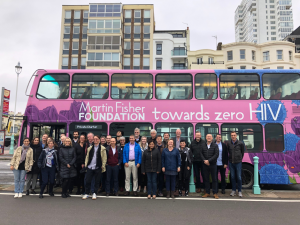Researchers advance digital health through European Consortium.
An international partnership of clinicians, social scientists, technology developers and HIV community activists met in Brighton in October for their penultimate consortium meeting. The University of Brighton leads two crucial aspects of the European Commission funded EmERGE project. Researchers from the Centre for Digital Media Cultures – Professor Flis Henwood, Dr Mary Darking and Dr Ben Marent – have worked alongside HIV activists, the European Aids Treatment Group, for the past five years to co-develop an mHealth platform consisting of a mobile phone app and virtual clinic. In addition, Dr Mary Darking is leading on the commercialisation of the platform through a not-for-profit strategy that aims to see the mHealth service delivered in five countries.
Not only is the Horizon 2020 EmERGE project an outstanding example of innovation and international collaboration, it is a prime example of how small, local collaborations can lead to significant initiatives. Brighton and Sussex University Hospitals Trust who lead the EmERGE project first reached out to the University of Brighton in 2013 when a small-scale pilot of the project received funding. Since then, the two institutions have deepened their partnership working to develop local capacity in digital health innovation leadership.
Dr Mary Darking, Director of the Centre for Digital Media Cultures, says of the EmERGE consortium “I feel very proud to work with the HIV activist community through the European Aids Treatment Group. This meeting was also an important opportunity to celebrate how innovative our local hospital trust is. The project is coming back to where it began with Professor Martin Fisher and Dr Jenny Whetham from our local HIV Clinic, The Lawson Unit”.
In fact, during the meeting, the team enjoyed a visit from the Martin Fisher Foundation bus. Named by Brighton and Hove bus company to pay tribute to Professor Fisher as an outstanding leader in the field of HIV medicine who built a world class service here in Brighton. The bus design was co-designed by the Martin Fisher Foundation and by Daniel Locke a local Brighton graphic designer ( http://www.daniellocke.com/ with messages and illustrations designed to support awareness of the need for more HIV testing and the need to combat HIV stigma.
Connected Futures played a pivotal role in the commercialisation strategy for the project. Taking the lead from the National Centre for Universities and Business (NCUB) directive, Professor Karen Cham supported the consortium through a fundamental change in strategic direction and collaborations between Connected Futures and the Centre for Digital Media Cultures are set to continue as the EmERGE project moves into its fifth and final year.


